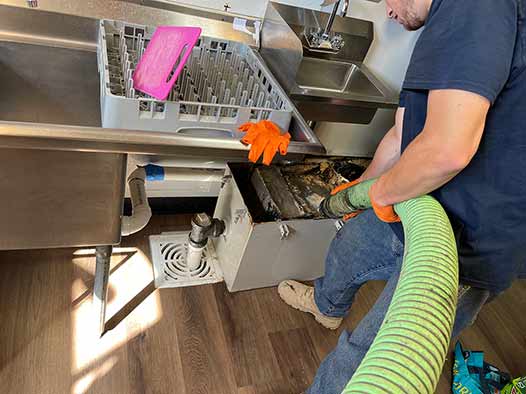
Restaurants generate a lot of food waste. A large part of this waste is grease, and sometimes, grease finds its way into the building’s drainage system and the city sewer lines, where it can cause massive damage. Restaurants have grease traps to prevent these problems.
Greasecycle® a professional grease trap cleaning company explains a grease trap is a receptacle where wastewater goes before it flows to the main sewer line and into the city sewer line. The purpose of this receptacle is to slow wastewater so the fats, oils and grease (FOG) it contains can be captured inside the receptacle and kept out of the sewers.
A grease trap can do this because oils, fats and grease are 10%-15% less dense than water. They float on top of the water instead of mixing with it. By reducing the flow rate of water when it enters the grease trap and cooling it down, the grease inside the water can be collected within the trap.
The benefit of doing this is that grease doesn’t enter the building’s main sewer line, where it can cause blockages. Additionally, grease is not allowed to enter the municipal sewer. If allowed to enter the city sewers, grease will form fatbergs that can inflict severe damage on the system.
But the fallout of using a grease trap to capture the FOGs in wastewater is that the grease trap can become clogged with grease. If this is allowed to happen, it can result in disastrous consequences for the restaurant, the building’s plumbing system and the city sewers.
Dangers of a clogged grease trap
Plumbing clogs
Grease hardens into a hard mass if allowed into the plumbing. That is because the lower temperature of the plumbing allows the grease to cool down. This hard mass will stick to pipe walls and attract debris that will clog the pipes.

Offensive odors
The grease turns rancid and emits a bad odor when it stays too long inside a grease trap. Pungent gases can flow backwards from the grease trap into the restaurant. Bad odor in a restaurant is not compatible with giving people a good dining experience.
Poses a health risk
The problem with these bad odors is not just their unpleasant nature. These are toxic gases that can make employees ill. They can also trigger allergies and expose the restaurant to the risk of lawsuits.
Constitutes a fire hazard
Grease is highly-flammable. Having a grease trap filled with grease near an area where fire is used to prepare meals is a risk. Once a grease fire has started, it is very hard to control. It is best to avoid the danger completely.
The risk of fine
A clogged grease trap creates unsanitary conditions that violate the city health codes. These can attract hefty fines from the authorities or even temporary closure. If grease from the restaurant is found to have damaged the city sewers, the fines can even be heavier.
The benefits of cleaning your restaurant’s grease trap regularly
You can avoid these problems by cleaning the grease trap on a schedule. Doing that will secure the following benefits for your restaurant:
Protect your grease trap
Regular cleaning prevents damage to your grease trap and maintains its effectiveness. If grease is allowed to remain in a grease trap for a long time, it will produce sulfuric acid, which will start to attack the materials of the grease trap. By cleaning your grease trap regularly, you can prolong its life.
Improved service quality
Happy employers and satisfied customers are the hallmarks of a successful restaurant business. You cannot achieve these results if your restaurant has bad odors lingering in the restrooms, kitchen and restaurant floor. Customers will leave if a restaurant is clean but has a bad smell.
Prevents clogging
A clogged grease trap will not stop fats, oils and grease from entering your plumbing. The result is that you will spend more money clearing clogs from the sewer line. If those clogs result in a sewer backup, you will have to close the shop for a while.

It is cost effective
Compared to the cost of clearing out a clogged sewer line, fixing damage caused by a backed-up sewer or replacing your damaged grease trap, it costs you nothing to clean your grease trap. Cleaning your grease trap regularly and flushing out the incoming lines with hydro jetting ensures your restaurant’s operations are never interrupted.
Protects the environment
Cleaning your grease trap regularly is a service to humanity and the environment. By keeping FOGs out of major waterways and infiltration fields, where they can cause severe problems, you will be playing your role as a responsible citizen.
To conclude, the reason for the existence of your restaurant business is to make money. Regular cleaning of your restaurant’s grease trap is good business because it can help you earn and save money.

